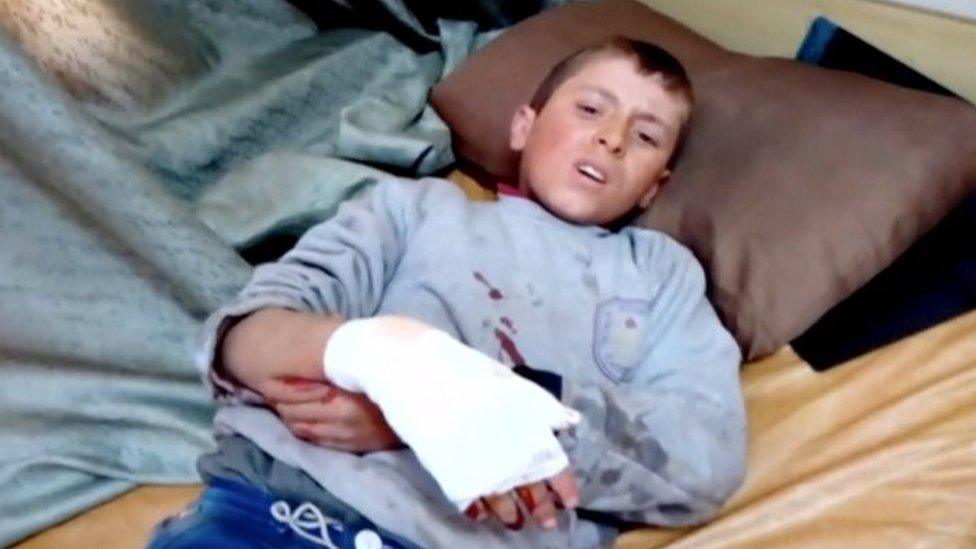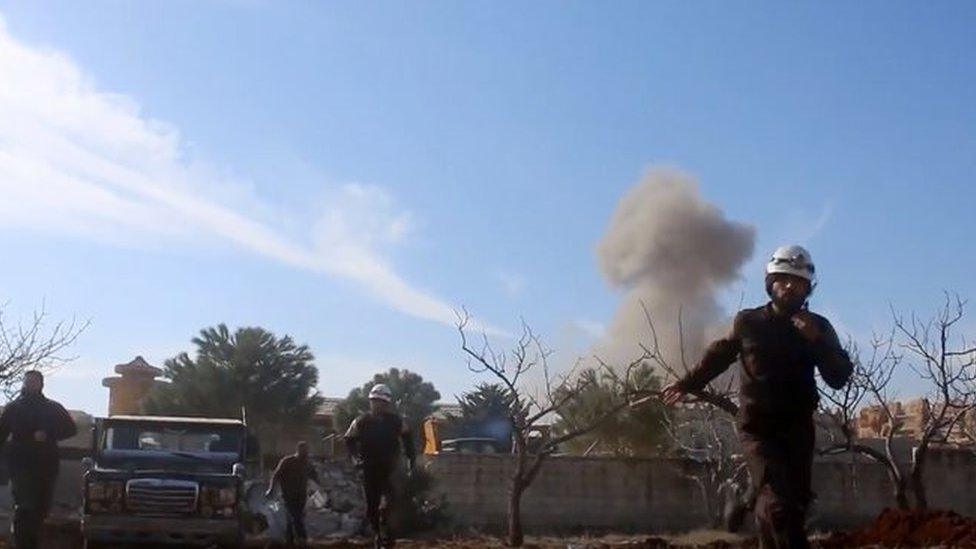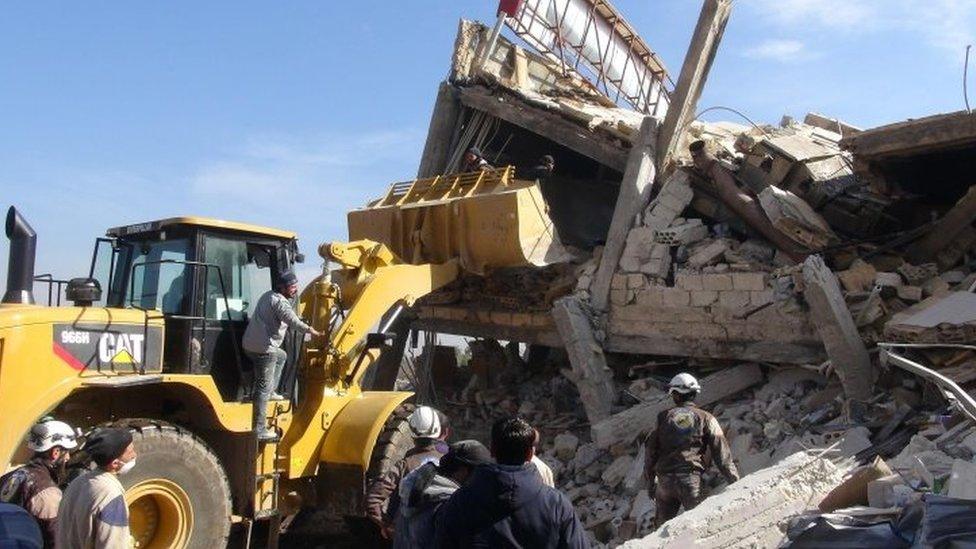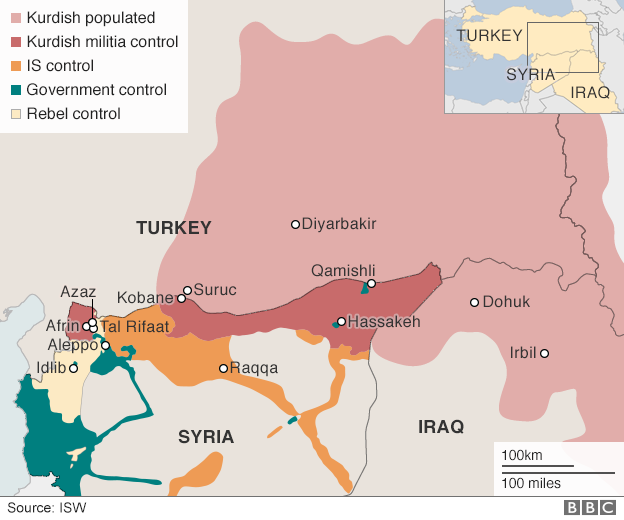Syria crisis: Air strikes on hospitals 'war crimes'
- Published
Diplomatic correspondent James Robbins: "Russia is being widely blamed"
France and Turkey have said that air strikes on hospitals in northern Syria constitute war crimes.
Up to 50 people were killed in missile attacks on schools and hospitals in the region, the UN said.
Turkey's foreign ministry blamed Russia for the attacks. Moscow has yet to respond to the allegations.
Meanwhile, Syrian President Bashar al-Assad has cast doubt over plans to implement a "cessation of hostilities" in Syria.
Last week world powers agreed to work towards a selective truce in Syria, to begin later this week.

This boy was among those reported to be injured in the missile attack on a hospital in Azaz

Rescue workers had to deal with chaos on the ground and the fear of more explosions
The UN envoy to Syria, Staffan de Mistura, is in the capital, Damascus, to discuss the implementation of the truce - which could include the immediate delivery of humanitarian aid to besieged areas.
Earlier, in his first comments on the announcement, President Assad said such a ceasefire did not mean all the parties would put down their weapons.
"So far they say they want a ceasefire within a week," he said in televised comments.
"Who is capable of gathering all these conditions and requirements within a week?"
The UN said the raids in northern Syria "cast a shadow" on the prospects for a cessation.
Medecins Sans Frontieres charity suggests attacks on hospitals were 'deliberate'
At least 12 people were killed in Azaz and the surrounding area, with two hospitals and two schools reportedly hit.
In Maarat al-Numan, in Idlib province, a hospital run by Medecins Sans Frontieres (MSF ) was reduced to rubble.
Seven people were killed and another eight are still missing the medical charity said, calling it a "deliberate" attack.

What does the law say about bombing hospitals?

The clear-up operation on the bombed hospital has now begun in earnest
International humanitarian law bans any attack on patients and medical personnel or indeed any attack on medical facilities, unless they are used for military purposes
However, even if they are identified as a military objective, such a target must not be attacked if the scale of collateral civilian casualties is likely to be disproportionate to the military gain
Indiscriminate attacks are prohibited

Mego Terzian, president of MSF France, told Reuters "either the [Syrian] government or Russia" was responsible.
But the Syrian ambassador to Moscow Riad Haddad said the US was to blame, a claim the Pentagon dismissed as "patently false".
"We have no reason to strike in Idlib, as Isil (so-called Islamic State) is not active there," spokesman Capt Jeff Davis said.
A second hospital in Maarat al-Numan was also hit, killing three people, activists said.
'Obvious war crimes'
The US - like the UN - has not directly identified who was responsible for the air strikes - but was strongly critical of the latest violence.
"That the Assad regime and its supporters would continue these attacks... casts doubt on Russia's willingness and/or ability to help bring to a stop the continued brutality of the Assad regime against its own people," the State Department said.
France said it condemned the bombing of the MSF clinic in the strongest terms, with Foreign Minister Jean-Marc Ayrault saying such acts "constitute war crimes".
Turkey called the attacks "obvious" war crimes. Relations between Turkey and Russia are badly strained, with the pair on opposite sides of the Syrian conflict.
Russia has been backing the Syrian government in its offensive against rebels but says it only targets what it calls "terrorists".
Meanwhile, Kurdish forces have captured the town of Tal Rifaat from Islamist rebels in northern Syria, the UK-based monitoring group the Syrian Observatory for Human Rights said.

This was despite three days of shelling from Turkey, which views the YPG militia in Syria as allied to the outlawed PKK, which has carried out a decades-long campaign for autonomy in Turkey.
Turkish Prime Minister Ahmet Davutoglu promised the "harshest reaction" if Kurdish forces tried to take nearby Azaz.
The militia has taken advantage of the chaotic situation to extend its territory near the border, just as a Syrian government offensive threatens to surround Aleppo further south.
Almost five years of civil war in Syria have led to the deaths of more than 250,000 people. More than 11 million people have been displaced.